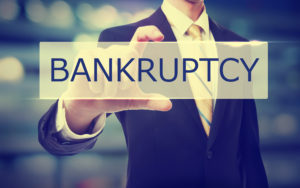 Section 706(a) of the Bankruptcy Code (“Code”) provides “[t]he debtor may convert a case under this chapter to a case under chapter 11, 12 or 13 of this title at any time, if the case has not been converted under section 1112, 1208 or 1307 of this title.” While the Code is clear as to the debtor’s right to convert generally, it offers little guidance as to what happens if the debtor seeks to convert their case after receiving a Chapter 7 discharge, a point upon which courts are split.
Section 706(a) of the Bankruptcy Code (“Code”) provides “[t]he debtor may convert a case under this chapter to a case under chapter 11, 12 or 13 of this title at any time, if the case has not been converted under section 1112, 1208 or 1307 of this title.” While the Code is clear as to the debtor’s right to convert generally, it offers little guidance as to what happens if the debtor seeks to convert their case after receiving a Chapter 7 discharge, a point upon which courts are split.
In re Carter, 285 B.R. 61 (Bankr.N.D.Ga.2002) held that a debtor can convert a case even after he receives a discharge, noting that there was nothing in the Code that expressly barred a conversion from chapter 7 to chapter 13 after a discharge was granted. Further, no provision in the Code expressly requires, as a condition of such conversion, that a chapter 7 discharge be vacated. In response to an argument that a post-discharge conversion made no sense because the purpose of a Chapter 13 is to repay debt, and issuance of the discharge effectively means that there is no longer any debts to pay, the court responded by stating that the effect of a discharge is to prevent the collection of a discharged debt as a liability of the debtor, not affect the liability of any other person or entity for the debt. Specifically, a creditor’s claim remains enforceable against the debtor’s bankruptcy estate.
Carter also addressed the argument that a debtor could not convert a Chapter 7 case to one under Chapter 13 after receiving a Chapter 7 discharge because only one discharge can be received in each case. The court noted that if Congress had intended to prevent a debtor from receiving both a Chapter 7 and a Chapter 13 discharge in the same case, it would have included the statutory prohibition in Section 348 of the Code which details the effects of conversion from one chapter to another, or in Section 1328 of the Code which provides the condition for receiving a Chapter 13 discharge. However, no such language was included in any section of the Code. Additionally, Carter concluded that there was little harm or prejudice to creditors in allowing a discharged debtor to proceed in a Chapter 13 case because, even if the Chapter 7 discharge reduces the debtor’s incentive to complete planned payments, the debtor will not receive the second discharge unless and until the plan payments are made. The court concluded as follows:
If it appears to the court that a particular debtor is clearly attempting to use a post-discharge conversion to escape both the liquidation of his or her assets and payment of debts out of future earnings, the court may deny the conversion in the first instance upon the finding of “extreme circumstances.
A similar conclusion was reached in In re Johnson, 564 B.R. 653 (E.D.Cal.2017). which recognized that a debtor does not have an absolute right to convert to Chapter 13, citing to Marrama v. Citizens Bank of Massachusetts, 549 U.S. 365, 372–73 (2007) (holding that a debtor’s bad faith could stop him from qualifying as a debtor under Chapter 13); and In re Rosson, 545 F.3d 764, 767–68 (9th Cir.2008) (same). Johnson noted, nevertheless, that as long as the debtor followed procedural rules and established his eligibility for a Chapter 13 conversion, his Chapter 7 discharge would not preclude him from converting to a Chapter 13 case.
In re Pike, 2020 WL 6927658 (Bankr.S.D.Ill. August 7, 2020), also found such discharges possible and then focused on the effect of that discharge in the context of the converted case. In support, the court quoted at length the analysis provided in In re Mosby, 244 B.R. 79, 87 (Bankr.E.D.Va.2000), which stated:
[T]he argument that once a discharge has been issued there are no debts for a plan to pay cannot be supported by a close reading of the Bankruptcy Code. The effect of a discharge is to prohibit collection of the discharged debt ‘as a personal liability of the debtor.’ It does not affect the liability of any other person or entity for the debt. In particular, nothing in the Code suggests that a discharge eliminates the creditor’s claim against the bankruptcy estate. * * * * The bankruptcy estate comes into existence upon ‘the commencement of [the] case.’ Claims against the estate, if objected to, are determined ‘as of the filing of the [bankruptcy] petition.’ Even in a chapter 7 case that has never been converted, the sequence of events is such that the debtor generally receives his or her discharge prior to the trustee making distributions to creditors. It has never been seriously argued, however, that creditors whose debts are discharged in the course of an unconverted chapter 7 case thereby suddenly lose the right to receive their pro rata share of distributions. The analysis is not altered simply because the case is converted. The conversion of a case does not change the date of the commencement of the case or the date of the filing of the petition. Thus, creditors with valid claims against the bankruptcy estate on the date the bankruptcy petition is filed do not lose them simply because the debtor is granted a discharge or the case is converted to another chapter.
Other courts have stated that conversion can be denied after a Chapter 7 discharge only in “extreme circumstances.” In re Cabral, 285 B.R. 563, 575 (1st Cir.BAP 2002) (holding conversion may be denied in “extreme circumstances” such as subjective bad faith, where conversion would be objectively futile or result in an abuse of process, or some other gross inequity); In re Martin, 116 F.3d 480 (8th Cir.1997) (debtor’s bad faith in filing Chapter 7 petition and legal manipulations in efforts to convert, constituted “extreme circumstances,” sufficient to support denial of debtor’s motion).
However, other courts have taken the position that if a discharge has been entered in the Chapter 7 case, then conversion is inappropriate. In re Lesniak, 208 B.R. 902 (Bankr.N.D.Ill.1997) stands for the proposition that courts are prohibited from converting cases from Chapter 7 to Chapter 13 if the request to convert is made by the debtor post discharge. Lesniak has been interpreted as imposing a “bright-line rule.” The court concluded that conversion after entry of the Chapter 7 discharge would constitute an abuse of the bankruptcy process.
In In re Caruso, 272 B.R. 254 (Bankr.D.Neb.2001) the court followed the logic of Lesniak. The court noted it would be bad public policy to permit a debtor to obtain the protection of the Code, including the automatic stay and the discharge of most, if not all, all of the claims against the debtor, and then permit the debtor to proceed in Chapter 13, retaining all claimed property interests, and treating the potentially nondischargeable debt as a general unsecured claim with little or no payment from the Chapter 13 plan. Id. at 256.
The court In re Hauswirth, 242 B.R. 95 (Bankr.N.D.Ga.1999) reached a slightly different conclusion. The court agreed that a debtor may not convert from Chapter 7 to Chapter 13 and retain his Chapter 7 discharge. The court went on, however, to conclude that it could grant the debtor’s motion to convert by revoking the Chapter 7 discharge. The court explained its analysis as follows:
If Debtor wants the benefit of a Chapter 13 discharge after the administration of a Chapter 7 case, . . . she may file a Chapter 13 case. To collapse the two proceedings into one, however, is inimical to the structure of the Bankruptcy Code. Debtor’s conversion to Chapter 13 before the Chapter 7 Trustee has completed the administration of the estate but after the discharge order is entered thwarts the proper operation of the Code, as it interrupts the complete administration intended by Congress. Pursuant to Bankruptcy Rule 9024, which incorporates FRCP 60, or alternatively, pursuant to this courts authority under 11 U.S.C. §105, the inconsistency of allowing the debtor two discharges in one case may be avoided by vacating the Debtor’s Chapter 7 discharge.
Matthew T. Gensburg
[email protected]

